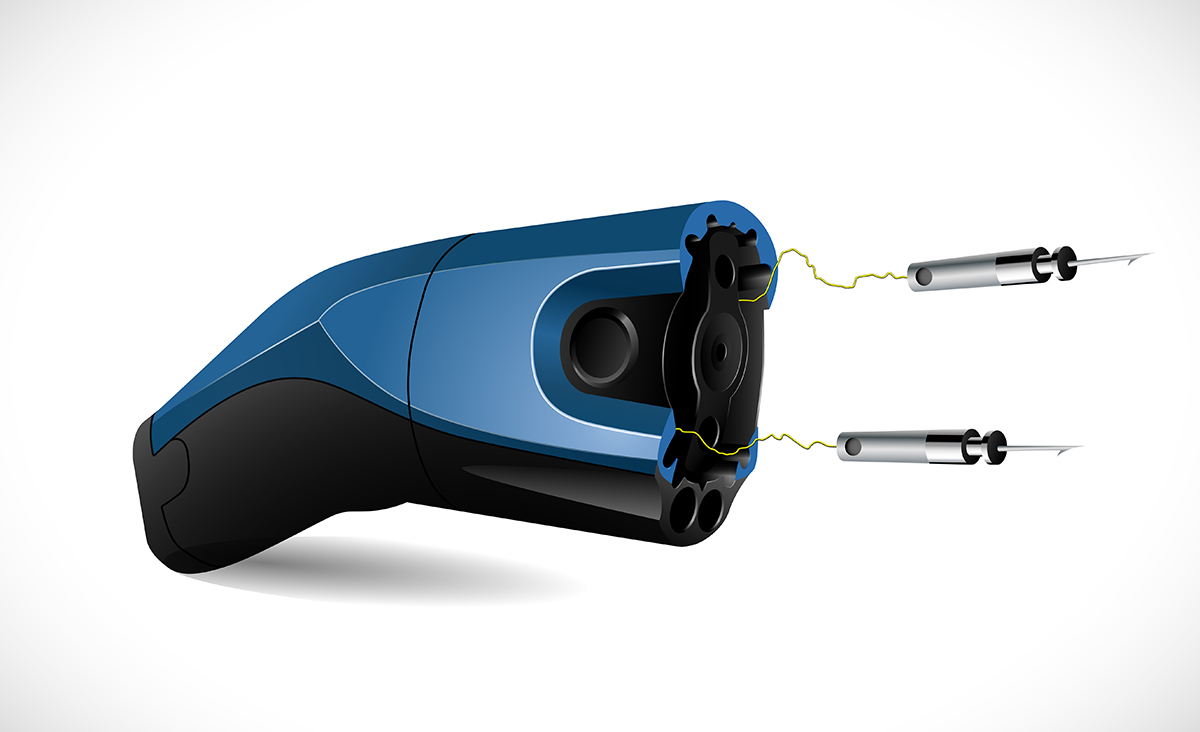Supreme Court Vacates Massachusetts Supreme Judicial Court Decision on Stun Guns

A stun gun via Shutterstock
The Supreme Court unanimously ordered the Massachusetts Supreme Judicial Court to reconsider their 2015 ruling against a homeless woman that declared stun guns are not covered by the provisions of the Second Amendment. The ruling vacates the 2013 conviction of Jaime Caetano, a homeless woman who was convicted of of illegally possessing a stun gun. Caetano obtained the stun gun from a friend for protection from a physically abusive ex-boyfriend who repeatedly ignored restraining orders and was nearly twice her size. Caetano was arrested after police found the gun in her purse during a 2011 shoplifting investigation at an Ashland Shaw’s.
After her conviction, Caetano was put on probation and appealed, citing McDonald v. Chicago and District of Columbia v. Heller as reasons why her conviction should be thrown out and her stun gun returned. Both of those decisions involve affirming that the Second Amendment guarantees the individual right to gun ownership. The SJC rejected her arguments on the grounds that stun guns did not exist when the Constitution was drafted. From the SJC original ruling:
The ban on the private possession of stun guns will not burden conduct that falls within the scope of the Second Amendment if a stun gun is a weapon not “in common use at the time” of enactment of the Second Amendment and would be dangerous per se at common law without another, primary use, i.e., as a tool.
For reasons that follow, there can be no doubt that a stun gun was not in common use at the time of enactment, and it is not the type of weapon that is eligible for Second Amendment protection.
The Supreme Court rejected all of the SJC’s reasoning in Monday’s two page per curiam opinion on the grounds that they totally ignored the precedents set by The District of Columbia v. Heller and McDonald v. Chicago.
In 2008, the 5-4 Heller decision struck down Washington, D.C.’s longstanding ban on individual handgun ownership on the grounds that it was a violation of the Second Amendment. The decision also declared that people do not need to be members of a militia in order to own a firearm for lawful purposes like self defense. In 2010, the court again expanded Second Amendment rights to state and locals laws in its 5-4 McDonald, ruling that a Chicago ordinance banning handgun ownership was invalid under the court’s Heller decision through the Fourteenth Amendment’s due process clause.
It’s important to remember that the Supreme Court’s opinion is not a reversal of Caetano’s conviction; it’s still possible for the SJC to reinstate her conviction after following the Supreme Court’s guidance. The ruling, commonly known as a summary reversal, does not overturn any existing state laws.
The office of Middlesex District Attorney Marian Ryan, the prosecutor in the Caetano case, said in a statement that they look forward to the additional guidance on this issue from the Supreme Judicial Court.
“This case was prosecuted under the current Massachusetts law that bans private ownership of stun guns and classifies them as dangerous weapons. Today’s opinion asks the Supreme Judicial Court to further review this statute. We will await guidance from the court as they examine this issue,” said Ryan spokesperson Meghan Kelly in an emailed statement.
Two of the court’s more conservative justices, Samuel Alito and Clarence Thomas, blasted the SJC in a separate non-binding opinion that was several pages longer than the court’s primary ruling:
“A State’s most basic responsibility is to keep its people safe. The Commonwealth of Massachusetts was either unable or unwilling to do what was necessary to protect Jaime Caetano, so she was forced to protect herself. To make matters worse, the Commonwealth chose to deploy its prosecutorial resources to prosecute and convict her of a criminal offense for arming herself with a nonlethal weapon that may well have saved her life. The Supreme Judicial Court then affirmed her conviction on the flimsiest of grounds. This Court’s grudging per curiam now sends the case back to that same court. And the consequences for Caetano may prove more tragic still, as her conviction likely bars her from ever bearing arms for self defense.
If the fundamental right of self-defense does not protect Caetano, then the safety of all Americans is left to the mercy of state authorities who may be more concerned about disarming the people than about keeping them safe. “
The ruling is being celebrated as a win by Second Amendment advocates in Massachusetts. “I think it’s about time the Massachusetts court was told to respect the civil rights of gun owners. It’s been pretty clear since the Heller and McDonald cases they were looking for any excuse to limit our Second Amendment rights,” said Jim Wallace, executive director of the Gun Owners Action League in an interview with Boston.
Law enforcement officials sounded disappointed by the court’s ruling.
“Unfortunately, it’s another impediment in the way of gun control. I think the Legislature was wise when they passed the prohibition because these [stun guns] can be very dangerous. And the fact that they’re intended not to kill does not mean that in certain circumstances, they could not actually cause an unfortunate result,” said Berkshire District Attorney David F. Capeless, president of the Massachusetts District Attorneys Association, in an interview with theBoston Globe.
A date has not been set for when the SJC will take up the case again.


